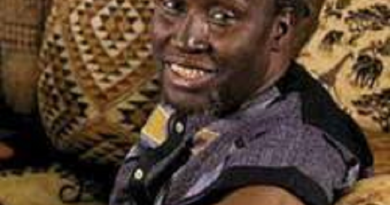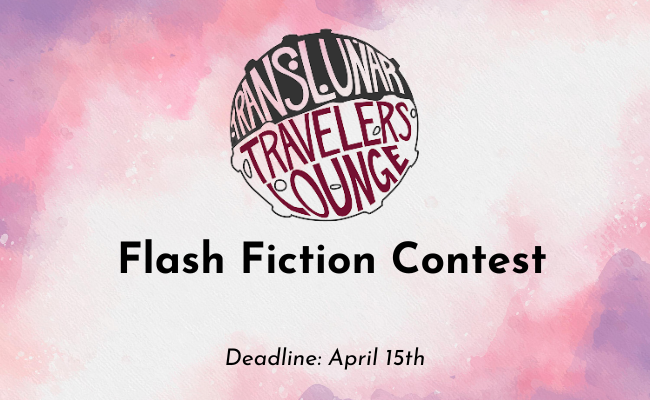❝My idea of writing is such that it goes hand in hand with activism, always❞ —An Interview with Quramo Writer’s Prize Winner, Ibrahim Babatunde Ibrahim
Ibrahim Babatunde Ibrahim would be a familiar name if you were seated– physically or virtually–among the crowds that graced the Eko Hotel hall for the Quramo Festival in 2022, where he was announced the winner. He has also been a runner-up for the Jessica George Bursary (2023), the Goge Africa Writing Contest (2020), and Ibua Journal’s Pack Light series (2020) and a lot more awards. Not just a writer, Ibrahim serves as the managing editor of The Journal of African Youth Literature, a subject matter expert at Wordbrew, and a contributing writer at MEER. Ibrahim writes from the West Midlands, UK, and his work explores the human experience from an African perspective. He believes in the power of storytelling, not just for its entertainment but, more importantly, its unrivaled ability to shape minds across generations.
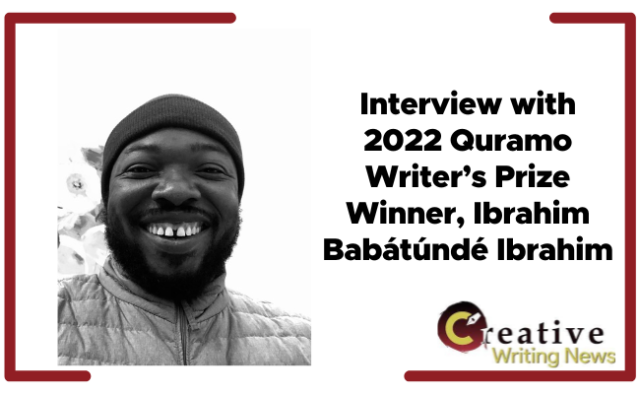
For our interview with him, he tells Creative Writing News about his pivot from working in media and entertainment to full-time creative writing, the importance of taking submissions seriously, and why planning is important in writing.
Thank you very much for honoring our request to interview you. I’ll start with the very obvious question: How did you find out about the Quramo Writer’s Prize? Were there other competitions you had your eyes on, too?
It’s my pleasure, Emmanuella.
I had known about the Quramo Writer’s Prize before 2022, I just didn’t have anything to submit then. I am one of those writers who see the submission part of writing as the writer’s main job, and so I take it very seriously. I always keep tabs on submission opportunities online, especially on Twitter—I share with other writers and they share with me too. So, I knew about the prize quite alright, but if I’m being honest, I cannot particularly say this way or that way was how I first found out about it. For that year’s edition, however, the call was sent to me by an editor and friend, Deborah Oluniran Adeniyi.
As far as other competitions, as I said, I always keep tabs on submission opportunities, but it is not all about submitting. Submission guidelines are sacred, and so you must be sure that you have something that ticks all the necessary boxes. I didn’t submit to the Quramo Writer’s Prize until I was sure I had that, and that’s my attitude towards other opportunities as well. When I see things my spirit wants, I detach and go to work. There’s no guarantee that you’ll win anything, but at least you can satisfy your own self knowing that you put your best foot forward.
I was present at the award night, so I am aware your editor received the prize on your behalf, which means your work went through various edits before reaching the final stage. How many drafts did the story end up having before submission?
You’re right. I couldn’t be there at the award ceremony, but I really wished I could. I had had similar evenings during my time in media and entertainment, but that particular one was going to be my first major prize as a writer, my first as me, and not part of a winning musical artiste’s team. So you can imagine just how much I wanted to be there. It’s not as though I knew beforehand that I’d win, but there was just such a rich euphoria around the shortlist and not being there felt like I was missing out.
Anyway, I was ably represented by Temitayo Olofinlua, one of the many editors who have kindly held my hand and helped shape my work in a general sense. I say in a general sense because she didn’t actually work on that winning manuscript. At the time I submitted to the prize, no major editing work had been done on it. Halima Aliyu helped with the first chapter. I did a private workshop with Samiat Salami for the next five or six chapters. And my writing group helped critique one or two chapters as well. But that was it. For context, the book has 34 chapters. I rounded it up, did a self-edit, and shot it in.
I think it was fitting that it was Temitayo who represented me that evening though. During the lockdown in 2020, I was talking to her about feeling ready to leave short stories for a bit and do a full-length novel. The project I wanted to work on was different. But she showed me the potential of doing the winning manuscript instead. She had read my short story, ‘Shreds’, published by The Shallow Tales Review, and because I was grounded in Ilorin at the time, she was convinced it was a great opportunity to research a longer work since the original premise was based around Ilorin.
What led you to submit for the prize, and how did you feel when you hit send?
I submitted because I felt ready, I had read the submission guidelines and was sure that I had ticked all the boxes. I submitted only a few minutes before the deadline, so if there was anything I felt after hitting the send button, it was relief that I didn’t miss it.
How was it like writing your winning story?
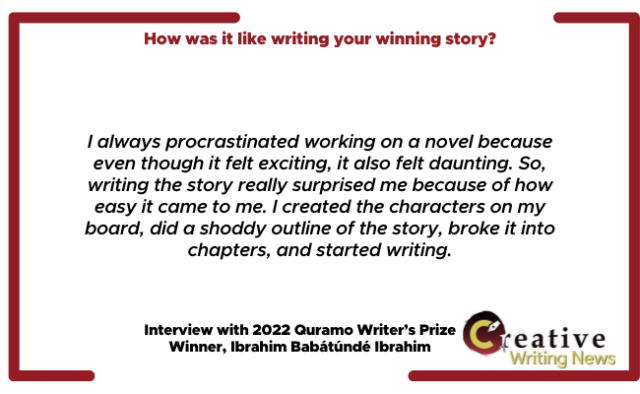 I always procrastinated working on a novel because even though it felt exciting, it also felt daunting. So, writing the story really surprised me because of how easy it came to me. I created the characters on my board, did a shoddy outline of the story, broke it into chapters, and started writing. This was in January 2021. At the end of the day, that outline I did had to step aside because the moment I found my groove, the story started to write itself and take me to places I hadn’t planned.
I always procrastinated working on a novel because even though it felt exciting, it also felt daunting. So, writing the story really surprised me because of how easy it came to me. I created the characters on my board, did a shoddy outline of the story, broke it into chapters, and started writing. This was in January 2021. At the end of the day, that outline I did had to step aside because the moment I found my groove, the story started to write itself and take me to places I hadn’t planned.
By March, I was done with about 75% of the book. Then I took a break as I was working on relocating from Nigeria at the time. I didn’t come back to it until around June, I think—I was finally done with everything in August. I started the self-edit immediately because I knew I was leaving Nigeria in September or October and I wanted to make sure it was done before then. Relocating to a new place, I didn’t know what I would meet, so finishing the book before leaving was important.
How long have you been writing?
Writing, as in literature, since March 2019. I did a lot of writing as a child, but I’m not sure that counts. Also, I did other types of writing in my former career, but it was in March 2019 that I decided I was leaving it all behind to become a creative writer.
What is your writing process/routine? Is there any special thing you do, or something specific you did for your Quramo Writer’s Prize story?
Usually, I’m a pantser. If I have an idea, I just sit down and write it. But as I’ve grown as a writer, I’ve seen the benefits of also being a planner, so these days, I’m in between both. This is important because writing on the whim, as great as it is, would oftentimes not give you the depth that some stories require. Our days are filled with little bits of inspirational gems, all there to be excavated by those who are observant enough. Every moment, every gesture, every speech, every sound, every smell, every sight, can tell you something you didn’t know before, or remind you of something you always knew but didn’t take seriously.
Since I started paying attention, my Notepad app has been full. Oftentimes I don’t get to use a lot of the things I write down, but I suppose the growth is in actually being observant enough to notice them in the first place.
For the Quramo Writer’s Prize story, I didn’t do much planning. Even the small outline I did ended up taking the backseat, so I can say that the manuscript was largely a product of pantsing. But I’m working on a new manuscript right now and I have planned it until the last scene. I don’t intend to follow through on everything I planned though, so as I’ve been writing, I’ve been pantsing a little bit just to break the rigidity of planning and give the storytelling some balance.
What is your winning story about and Why did you want to write it?
There’s something called Ìyàwó Sàráà, and in Ilorin where I’m from, it is very much a thing. Arranged marriages are popular, but Ìyàwó Sàráà is a bit different. In Yorùbá, Ìyàwó means ‘wife’ and Sàráà means ‘giveaway’. That should give you an idea. Some people give their daughters away because they have too many mouths to feed. For some, it could be as settlement for a debt. Some just want an affiliation with a powerful family. Whatever it is, the girl is a gift and whichever house she’s given to would then look inward and appoint any of their men who they feel can take care of her.
As a child, I remember my Dad being offered an Ìyàwó Sàráà which he respectfully declined. Being in Ilorin during the lockdown opened my eyes to the fact that this practice was still a thing, and so I decided to learn more and write about it.
In my story, I mirrored this with the relationship between Ilorin politics and religious herd mentality. A girl child becomes a pawn in that chess game. She’s given out at 16, a rape attempt is made on her, an unforeseen calamity occurs as she struggles to defend herself, then all hell breaks loose and she must prove her innocence. That’s the story in a nutshell.
Can you tell us how it felt when you were announced as the 2022 Quramo Writer’s Prize Winner?
It was really tense, especially as I wasn’t there. It probably took a while before anyone remembered that they hadn’t told me yet following all the jubilation. My sister called, and just as I was picking up, I saw an Instagram post, I think, of Temitayo holding the large cheque. A solemnness overcame me. My knees felt like bread in water, I had to take a seat.
You must understand that for me, it was different. I was a storybook buff as a child, but was forced to science class and was dissatisfied going through school. I only ever found solace and let go of the grudge when I pitched my tent in the entertainment industry and found some success there. But in the end, literature kept calling and I finally walked away from everything else to answer. Many thought I was mad when I went from being the General Manager of a top record label to becoming an intern at Okadabooks in 2019. Even I thought I was mad when that entire year, I couldn’t get one story published despite submitting everywhere. But I persevered and the publications finally started pouring in at the turn of 2020, but nothing crowned that perseverance and reassured me that I wasn’t mad more than winning that prize.
There had been other glorious moments before then, and many more after, but that one stood out. So if I tell you that I can’t explain how I felt when I was told that I won, I’m sure you’ll understand now.
What do you think the judges admired about your story? How does it connect with readers?
What the judges admired, I’m not sure I can particularly tell. I have my ideas, but only the judges would be able to answer that correctly.
As for how the story connects to readers, I believe they would find the characters and many of the key events relatable. Also, I did my best to create a setting that would hold the reader in until the last page is turned. Anyone who is familiar with Ilorin would immediately feel at home, and for those who are not, they would leave the book feeling like they just traveled there.
Can you share a favorite line from your story?
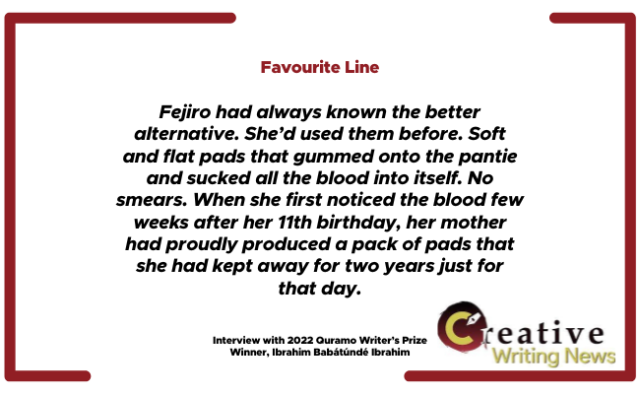 “Fejiro had always known the better alternative. She’d used them before. Soft and flat pads that gummed onto the pantie and sucked all the blood into itself. No smears. When she first noticed the blood few weeks after her 11th birthday, her mother had proudly produced a pack of pads that she had kept away for two years just for that day. Fejiro remembered them every time she placed pieces of cloth on her pantie to try and contain the flow, every time they failed. But this was the norm for her, so she had not expected the soberness it cast over the other girls now.”
“Fejiro had always known the better alternative. She’d used them before. Soft and flat pads that gummed onto the pantie and sucked all the blood into itself. No smears. When she first noticed the blood few weeks after her 11th birthday, her mother had proudly produced a pack of pads that she had kept away for two years just for that day. Fejiro remembered them every time she placed pieces of cloth on her pantie to try and contain the flow, every time they failed. But this was the norm for her, so she had not expected the soberness it cast over the other girls now.”
We are yet to see your story on shelves. Is there a particular reason you’d like to share? If not, should we expect it soon?
Well, Quramo Publishers and I couldn’t reach an agreement on the publishing contract, so while I retained the prize, I walked away with the manuscript. Let me quickly quell any suggestions of a quarrel. There’s no bad blood between me and Quramo. Nothing can change the fact that they gave me my major seal of approval as a writer, something that I don’t take for granted. But the manuscript is out on submission, looking for a new, different publisher. Hopefully, it finds one soon. I can’t wait for the book to finally kiss the shelves.
You’re currently an editor for some magazines, we presume. What tips would you give to writers hoping to submit to competitions?
Yes, I’m presently the Managing Editor at the Journal of African Youth Literature (JAY Lit) and the Fiction Editor at Rare Swan Press.
For writers hoping to submit to competitions, I’d advise that you treat the submission guidelines with a lot of respect. So many good submissions don’t even get considered at all because the writers didn’t follow the guidelines. More importantly, write for yourself, not awards, because if you only write for awards and you don’t win them, you will end up frustrated and perhaps not love the art as much as you should anymore. The one that is yours will surely not pass you by.
We know you have more stories to tell, what other prizes and awards are you gunning for?
Well, I am brimming with stories, but primarily, it’s more about these stories and telling them as best as I can than the prizes and awards. Don’t get me wrong, I’m all about prizes and awards, but the formula that got me the Quramo win was to focus on writing the story and then seeing where it would be a great fit. This has proven to be a winning formula, and as they say, if it’s not broken, don’t fix it.
Finally, what is your unpopular opinion about writing?
Many writers are fine throwing around names like Toni Morrison, Malcolm X, Charles Baldwin, Nelson Mandela, and Martin Luther King, but when it comes to walking in the lines of these great guys when an injustice is done, there’s a domino of their windows snapping shut. The silence is deafening and history is keeping records. Some say they just want to write for entertainment and that’s okay, but my idea of writing is such that it goes hand in hand with activism, always. Just as we read about Hitler’s crimes and wonder how he was able to murder so many Jews while many were silent, so shall our kids in a few years read about the genocide in Gaza and ask what their parents were doing when it was happening.
Thank you for your time and for the advice on what to do to prepare for not just the Quramo Writer’s Prize, but for all others. You can connect with Ibrahim Babatunde Ibrahim on his X (FKA Twitter) Page.



